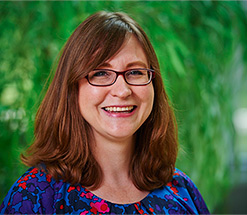Executive Officer's Report
Rebecca Shiner
Colgate University

Greetings, fellow ARP members! I am happy to be writing my first column for you as the Executive Officer of ARP. I was trained for this position last year by outgoing Executive Officer, Lynne Cooper, and I officially started in earnest in 2015. This is a great time to be serving in this role, as ARP continues to flourish and grow as an organization.
I want to begin by thanking Lynne Cooper for her many years of service to ARP. Lynne served as Secretary-Treasurer from 2009 to 2010 and then served as Executive Officer from 2011 to 2014. Lynne played a central role in establishing a strong foundation for our organization in so many of the ways that I will be describing in this column, and we all owe her a debt of gratitude. Lynne won the ARP Service Award this past June—well-deserved recognition for her years of generous service.
For fun, I recently looked back at previous issues of P to get a better sense of our web-recorded history. In her column as President in 2008, Julie Norem described ARP as having reached its "adolescence," a period in which "identity issues come to the fore, relationships between ARP and other organizations increase in importance (and will no doubt influence our organizational identity), and the mature infrastructure that will guide us in the years to come solidifies." I would like to suggest that ARP has now made it successfully out of adolescence and into "emerging adulthood"-we have established our identity by hosting a successful biennial conference, receiving our tax-exempt status as a corporation, and creating a strong infrastructure. Like good "emerging adults," we are still actively exploring potential pathways to follow in our next stage of development. In this column, I offer an assessment of where ARP stands right now and where we hope to be going in the next year or two.
ARP is a thriving scholarly organization, by the numbers:We currently have 384 members, which may be the largest our organization has been. Our webpage receives 69 page views per day, and our meta-blog receives 30 views per day. As others will surely recount in this newsletter, we held a tremendously successful conference in June in St. Louis, MO, chaired by Simine Vazire, Joshua Jackson, Jennifer Tackett, and Marc Fournier--with 255 attendees, three simultaneous programming tracks, and a variety of programs offered. Many first-time ARP attendees told me that ARP was their favorite meeting they had ever attended.
ARP continues to offer significant benefits to the community of personality scholars:- ARP members receive online access to our two journals: Journal of Research in Personality and Social Psychological and Personality Science. Members may also purchase hard copies of both journals at an extremely reduced price (for example, SPPS costs $12/year for members instead of $417).
- ARP is guaranteed a preconference slot at the annual SPSP meeting. For 2016, this preconference will again be the terrific Lifespan Social-Personality Preconference (http://lodismith.canisiuspsychology.net/lsp/media/lsp2016.pdf).
- We have a new database of personality-focused graduate programs and graduate programs with ARP-affiliated faculty: http://www.personality-arp.org/resources/graduate-programs/ Thanks to Jennifer Lodi-Smith and the rest of the training committee for compiling this list for our members.
- We offer a number of awards: the Tanaka dissertation award, the Murray award, and poster prizes for outstanding graduate student posters at our meeting.
- We continue to host a biennial meeting. The 2017 meeting will be held in Sacramento, hosted by UC Davis, with Rick Robins as the local chair. We will be looking for program co-chairs soon, so if you have someone to nominate or are interested yourself, please let an ARP board member know.
First, ARP has continued to pursue a stronger relationship with the European Association of Personality Psychology. We now have representatives on each other's boards; Will Fleeson is serving on EAPP's board, and Jaap Denissen is serving on ARP's. Each organization is now also sponsoring a symposium at each other's meeting. We will be investigating the possibility of joint dues reduction between the two organizations.
Second, ARP is considering sponsoring additional awards, to highlight the excellent work being done in the field of personality psychology. For example, we are considering the creation of an early career award and an award for reproducible research.
Third, our training committee is creating a database of job options outside academia, and ARP could do more to provide resources enabling our members to consider these kinds of career paths.
Fourth and perhaps most important, it may be time for ARP to start offering resources to strengthen the research in our field. For example, ARP could create a network connecting graduate students with other researchers to pursue collaborative projects. These projects could include replication studies and could also offer researchers the opportunity to collect larger samples. In addition, ARP could potentially generate a compendium of available datasets that include personality-relevant information.
I welcome your thoughts on all of these new initiatives and your ideas for others we have not thought of yet. ARP has entered into its "emerging adulthood" with a strong identity, and there are many exciting possibilities for where we could go from here.